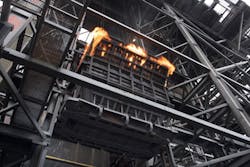At the SSAB steel factory in Raahe on the west coast of Finland, an alarm on a critical coke elevator operation suddenly went off. Luckily, this event took place during a time when SSAB’s automation partner, ABB, was on site working on equipment maintenance planning.
The team observed that one of the drives was giving off frequent alarms. So, as part of the ABB Remote Support service—which they were ironically testing that day—data from the system’s drive was analyzed by the ABB experts located over 600 km away in Helsinki. They spotted a current imbalance and, based on their experience, knew that this type of alarm sequence often indicates possible damage to power components. This, in turn, can stop both the drive and the elevator.
Acting quickly, both remotely and on site, the combined SSAB and ABB teams worked together to avert what could have been a major problem.
“In the coking plant we have what is called the dry quenching stage where an elevator lifts a bucket of hot coke into the dry quenching chamber,” said Ari Korkala, an electrical maintenance planner at the SSAB steel mill. “The elevators are crucial and if there is a malfunction, the whole process stops since nothing can be lifted. In addition, the coke is very hot at about 1050˚ C, so if it stops somewhere in between, it could cause a fire in the electrical rooms or elsewhere.”
This event illustrates two things: The importance of generating Industrial Internet of Things (IIoT) data, and the critical role of the often overlooked automation subsystems, like drives, to improve data analysis and enhance reliability.
“Our drives are not so much individual components but work as process sensors in the IIoT setting,” said Ari Lässämäki, vice president and head of the Drives and Controls Service at ABB. “Drives have the capability to interpret and analyze different indicators by themselves.”
For that reason, ABB has been developing its Remote Support services in its drive offerings with the most recent being the Remote Condition Monitoring service launched this past April. It is an extension of the company’s existing Remote Support service, which is aimed at shortening downtime after a failure. The Remote Condition Monitoring service, on the other hand, is a more comprehensive proactive service. ABB actively monitors the drives covered and uses its deep experience of what is the ‘normal’ state of operation in that type of drive. Based on that assessment, experts can achieve a good estimation of the condition of the device, and make accurate maintenance recommendations. Also, as part of the service the experts are always looking out for early indications of possible faults.
“We are excited about these services because we have now proven that they allow us to dig deeper and use the intelligence that the drives have,” says Jaana Kivela, ABB’s product manager for Remote Services. “In fact, drives may well be the most intelligent pieces of equipment in the sub-processes of industrial operations. Even though most industrial operations have high-level process automation systems, they are not looking that deeply into the sub-processes. Remote Services allow us to take that deeper look at these critical components.”
In Remote Support service the network adaptor is collecting the data and sends it to the cloud. There the data is readily available for analysis by an ABB expert who can interpret the data to find a resolution for the issue at hand. The same data collection method is used in the Remote Condition Monitoring service in which algorithms automatically analyze the data and look for specific indicators of potential abnormalities.
By interpreting drive signals, ABB can see many things that are happening in the process the drive is part of. As an example, they can detect pump cavitation from drive signals. Pump cavitation is a phenomenon that wears out the pump rapidly. Another example is the ability to see when excess dust accumulates in the fan since there is a risk that it can disrupt the fan’s operation.
And this is the power of IIoT at work.
According to Kivela, in many industrial applications that use pumps or fans, which are powered by a drive/motor combination, it is the drive that actually controls the operation. Even in larger systems, where an automation system or PLC is controlling the drive, it can provide important indicators about the operation of the motor and the application. The Remote Support program uses the information from ABB’s intelligent drives to provide the earliest possible indication of potential operational problems faster, helping operators to minimize costly breakdowns.
And, according to SSAB, it works.
“Thanks to the Remote Service, even though it was still in the pilot phase, we could spot this possible elevator problem at an early stage,” said Aki Heikkilä, an electrical maintenance supervisor at SSAB. “We were getting alarms and ABB saw indications that the drive was acting abnormally and might become faulty. We went to check it and, upon examination, we confirmed that some drive components needed replacing. Happily, we can plan this work before there was any production disturbance or unplanned downtime.”
Leaders relevant to this article:

